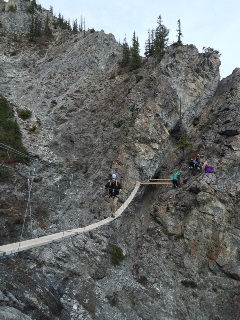Human resource management is often at the center of tremendous workplace change, most recently driven by computer technology and other analytics-driven resources. Now, HR is faced with an even bigger challenge ― the blending of people resources with robotics ― as companies continue to seek better, faster and cheaper processes to meet customer needs.
 "HR stands on the edge of a precipice with only two options: Invent a way across the chasm, or disappear into it," writes Sylvia Vorhauser-Smith in Forbes. "With technology and science disrupting the traditional work environment, questions about the direction in which HR is heading, what the future of work will look like, or whether we will work at all, are being asked."
"HR stands on the edge of a precipice with only two options: Invent a way across the chasm, or disappear into it," writes Sylvia Vorhauser-Smith in Forbes. "With technology and science disrupting the traditional work environment, questions about the direction in which HR is heading, what the future of work will look like, or whether we will work at all, are being asked."
This is not the first or the last time that HR has had to re-tool, says HR Certification Institute® (HRCI®) CEO Amy Schabacker Dufrane, Ed.D., SPHR, CAE. "HR has evolved significantly over the decades and will not stop evolving. Robotics will only amplify the needs of the workforce. Robots will need controllers and require more agile workforces. With the increasing speed of change, organizations must have the right people with the right skills, and in the right places at the right times, or companies will fail."
The Fallibility of Algorithms
Our path toward progress will continue to depend upon computers, algorithms and automation. Computer algorithms have enabled us to analyze data at a fraction of the time and expense. (Think of the analytics we receive on our marketing and promotion campaigns.) And, with automation, we can lower costs. (Think of all of those self-serve checkouts at grocery stores.)
Be careful, though. Algorithms and technology are not infallible. Human judgment, and the need for human resource management, will continue to play important roles.
In Luke Dormehl’s best-selling book, The Formula: How Algorithms Solve all our Problems . . . and Create More, we gain a deeper appreciation for the opportunities and challenges. While most people trust in the objective and non-judgemental results that a scientific-based algorithm provides versus the perceptions and judgements of humans, Dormehl reminds us that algorithms are constructed by humans. Therefore, algorithms have been shown to be subject to human prejudices, beliefs and judgements.
He also warns that algorithms further limit our vision ― the information that we see and the opportunities that we are aware of. Without the human diversity of expertise ― personality, beliefs, demographics and more ― we will have blind spots. We cannot know what we don’t know. We are at risk.
The Need for Human Engagement
Human engagement allows us to hear from those who are not like us, do not like our ideas or are not paid by us. Such encounters provide us with a more balanced information set from which to lead.
HR must intelligently create change and opportunities by consciously designing the places that are most appropriate for automation ― and for people. Let’s place robots where they perform best and people where we lead. Because of the rapid development of artificial intelligence, human resource experts and organizational executives and directors must evaluate, plan and stay in charge of the systems and the outcomes.
In the face or more technological change, are you ready? Is your company ready? What are your skills, gaps and collaborative characteristics? Rate yourself and your team with a few of these questions (on a Likert Scale):
Preparing for 2020
"Change won’t wait for us: business leaders, educators and governments all need to be proactive in up-skilling and retraining people so everyone can benefit from the Fourth Industrial Revolution," writes Alex Grey for the World Economic Forum. Those of us who hope to prepare ourselves for 2020, must act now to build our capabilities and expertise, and sharpen what the World Economic Forum sees as 10 essential skills: complex problem solving, critical thinking, creativity, people management, coordinating with others, emotional intelligence, judgment and decision making, service orientation, negotiation and cognitive flexibility.
Here is a call to your future: Imagine yourself as a champion in your work in 2020. You and your organization are celebrating a huge breakthrough. Together, you have accomplished what no one had dreamed possible. You feel elated! You are seen as one of the very best and you see your team as completely ready to take on the next opportunities.
Let this resonate within you. Feel your success. What changes did you make in your personal and professional life to get you to such great heights? Who was needed? And, what skills had to be developed?
It’s time to start working together so that we might invent the way. I invite you to ask yourself, "What is possible?"
David B. Savage is the founder of Savage Management, a consultancy firm devoted to making leaders and organizations more successful, and the author of Break Through to Yes. Savage also publishes weekly podcasts, including Zombies and Zippers, providing more discussion about HR’s role to bring people, ideas and innovations together. (Photo by David B. Savage.)
Leave a commentOrder by
Newest on top Oldest on top